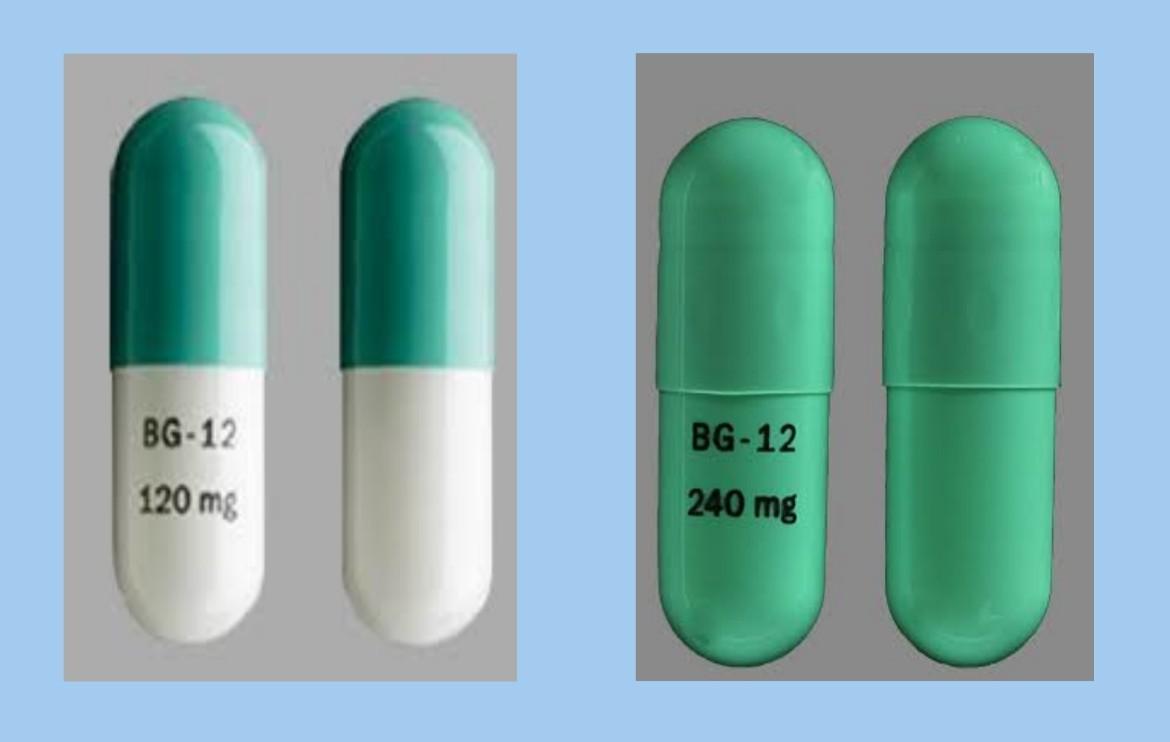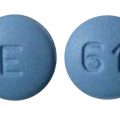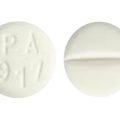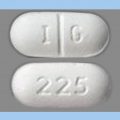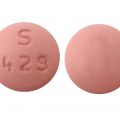Disease-modifying therapies (DMTs) are treatments that can reduce the activity and progression of multiple sclerosis (MS). They can be useful for both people with relapsing-remitting MS (RMS) and relapses of progressive forms of MS. A relapse is the worsening of symptoms and/or the appearance of new ones, which last at least 24 hours and are separated from a previous relapse by at least one month.
Disease-modifying therapies approved by the U.S. Food and Drug Administration (FDA) have been shown to reduce the frequency and severity of relapses. DMTs can also reduce the development of new lesions in the brain and spinal cord as seen on MRI scans, and appear to slow the development of MS disabilities. An early intervention with these treatments may help prevent permanent damage to the nervous system, which is associated with the destruction of myelin.
What is BG-12 240 pill?
The green, capsule-shaped pill with the imprint BG-12 240 mg has been identified as (Dimethyl fumarate) Tecfidera 240 mg supplied by Biogen Idec Inc.. While the green, white capsule-shaped pill with the imprint BG-12 120 has been identified as Tecfidera 120 mg also supplied by Biogen Idec Inc.. BG 12 pill is a disease modifying treatment (DMT) recommended for the treatment of ‘active’ relapsing multiple sclerosis. This is defined in guidelines as two or more relapses in the last two years.
In one trial, on average, people with multiple sclerosis saw a 53% drop in the number of relapses they had. In another trial, on average, people with MS saw a 38% drop in their disability getting worse. These trial results were compared to people with MS taking placebos.
Rather than counting a specific number of relapses, increasing numbers of MS specialists define ‘active’ multiple sclerosis as one recent relapse and/or signs on MRI scans that MS is active. These signs include new lesions, areas of damage, in the brain.
This disease modifying treatment is recommended for those with ‘active’ relapsing multiple sclerosis. BG 12 pill won’t work if you don’t get relapses, so you won’t be offered it if you have primary or secondary progressive MS.
How does BG 12 pills work to treat multiple sclerosis (MS)?
Originally a drug for the treatment of psoriasis, a trial in 2012 found that it could be an effective treatment for multiple sclerosis. We don’t know exactly how it works, but it dampens down inflammation. This may be helpful in reducing the inflammation that causes damage in the brain and spinal cord of people with MS. In 2014, the National Institute for Health and Care Excellence (NICE) gave the go ahead for the drug to be used on the NHS.
How well does BG 12 pill work?
MS drugs can be put into three groups based on how well they control it. The effectiveness of BG 12 pill is classed as ‘good’. This puts it between DMTs classed as ‘high’ effectiveness and those classed as ‘moderate’. This is based on how much it reduces relapses and slows down how fast people’s disability gets worse.
Relapses dropped by: 53%
This means that in one trial, on average, people saw a 53% drop in the number of relapses they had. This was compared to people who took a placebo, a dummy treatment with no drug in it.
Disability getting worse was slowed down by: 38%
This means that in one trial, on average, people saw a 38% drop in the risk of their disability getting worse. This was compared to people who took a placebo.
How do I take BG 12 pill?
The usual starting dose of Tecfidera is 120 mg taken twice a day. This is taken for the first 7 days and then the dose is increased to 240 mg taken twice a day.
Many things can affect the dose of medication that a person needs, such as body weight, other medical conditions, and other medications. If your doctor has recommended a dose different from the ones listed here, do not change the way that you are taking the medication without consulting your doctor.
BG 12 pills may be taken with or without food. If you experience flushing, or stomach problems, take the medication with food to reduce these effects.
Swallow the capsules whole with water or another fluid. Do not divide, crush, dissolve, suck, or chew on the capsule.
It is important to take this medication exactly as prescribed by your doctor. If you miss a dose, take it as soon as possible and continue with your regular schedule. If it is less than 4 hours before your next dose, skip the missed dose and continue with your regular dosing schedule. Do not take a double dose to make up for a missed one. If you are not sure what to do after missing a dose, contact your doctor or pharmacist for advice.
Store this medication at room temperature, protect it from light and moisture, and keep it out of the reach of children.
Do not dispose of medications in wastewater (e.g. down the sink or in the toilet) or in household garbage. Ask your pharmacist how to dispose of medications that are no longer needed or have expired.
Who should NOT take this medication?
Do not take this medication if you are allergic to dimethyl fumarate or any ingredients of the medication.
What side effects are possible with BG 12 pill?
Many medications can cause side effects. A side effect is an unwanted response to a medication when it is taken in normal doses. Side effects can be mild or severe, temporary or permanent.
The side effects listed below are not experienced by everyone who takes this medication. If you are concerned about side effects, discuss the risks and benefits of this medication with your doctor.
The following side effects have been reported by at least 1% of people taking this medication. Many of these side effects can be managed, and some may go away on their own over time.
Contact your doctor if you experience these side effects and they are severe or bothersome. Your pharmacist may be able to advise you on managing side effects.
- diarrhea
- flushing (e.g., becoming red in the face or body, feeling warm or hot, itchiness or burning sensation)
- heartburn
- nausea
- stomach pain or cramps
- vomiting.
Although most of the side effects listed below don’t happen very often, they could lead to serious problems if you do not check with your doctor or seek medical attention.
Check with your doctor as soon as possible if any of the following side effects occur:
- signs of infection (including fever or chills, severe diarrhea, shortness of breath, prolonged dizziness, headache, stiff neck, or unexplained weight loss)
- signs of liver problems (e.g., nausea, vomiting, diarrhea, loss of appetite, weight loss, yellowing of the skin or whites of the eyes, dark urine, pale stools)
- signs of protein in the urine (e.g., swelling of the face or legs)
Stop taking the medication and seek immediate medical attention if any of the following occur:
- signs of a serious allergic reaction (e.g., difficulty breathing; rash; or swelling of the face, lips, tongue, or throat)
- symptoms of progressive multifocal leukoencephalopathy (PML) (e.g., seizures, vision loss, trouble thinking clearly, difficulty walking)
Some people may experience side effects other than those listed. Check with your doctor if you notice any symptom that worries you while you are taking this medication.
Are there any other precautions or warnings for this medication?
Before you begin using a medication, be sure to inform your doctor of any medical conditions or allergies you may have, any medications you are taking, whether you are pregnant or breast-feeding, and any other significant facts about your health. These factors may affect how you should use this medication.
Infection: BG 12 pills can reduce the number of cells that fight infection in the body (white blood cells). If you are taking medications or have an illness that reduces your body’s ability to fight infection, discuss with your doctor how this medication may affect your medical condition, how your medical condition may affect the dosing and effectiveness of this medication, and whether any special monitoring is needed.
Tell your doctor immediately if you notice signs of an infection, such as fever or chills, severe diarrhea, shortness of breath, prolonged dizziness, headache, stiff neck, or unexplained weight loss. Your doctor will do blood tests regularly to monitor your white blood cell count.
Kidney function: Treatment with BG 12 pills may cause an increase in the amount of protein removed from the body by the kidneys. In some cases, this may indicate a decrease in kidney function. If you have reduced kidney function or kidney disease, discuss with your doctor how this medication may affect your medical condition, how your medical condition may affect the dosing and effectiveness of this medication, and whether any special monitoring is needed.
Your doctor may want to test your kidney function regularly while you are taking this medication.
Tell your doctor immediately if you experience symptoms of protein in the urine, such as swelling of the face or legs.
Liver function: Treatment with BG 12 pills may cause an increase in liver enzymes, which are chemicals produced by the liver. In some cases, increased liver enzymes can indicate a decrease in liver function. If you have liver problems, discuss with your doctor how this medication may affect your medical condition, how your medical condition may affect the dosing and effectiveness of this medication, and whether any special monitoring is needed. Your doctor may want to test your liver function regularly with blood tests while you are taking this medication.
Tell your doctor immediately if you experience symptoms of liver problems such as fatigue, feeling unwell, loss of appetite, nausea, yellowing of the skin or whites of the eyes, dark urine, pale stools, abdominal pain or swelling, and itchy skin.
Progressive multifocal leukoencephalopathy (PML): There have been reports of PML after using dimethyl fumarate. PML is a rare disorder that causes nerve damage in the brain and is more likely to occur in people who have a weakened immune system. If you experience memory loss, vision loss, trouble thinking, or difficulty walking, contact your doctor immediately.
Vaccines: Live attenuated vaccines such as yellow fever, BCG, cholera, typhoid, varicella, meningococcal, and diphtheria should not be given while you are taking BG 12 pills.
Pregnancy: BG 12 pills should not be used during pregnancy unless the benefits outweigh the risks. If you become pregnant while taking this medication, tell your doctor immediately.
Breast-feeding: It is not known if BG 12 pills passes into breast milk. If you are a breast-feeding mother and are taking this medication, it may affect your baby. Talk to your doctor about whether you should continue breast-feeding.
Children: The safety and effectiveness of using this medication have not been established for children below the age of 18.
Seniors: Seniors are more likely to have medical conditions that may be affected by BG 12 pills. If you are a senior and taking this medication, your doctor should closely monitor your medical conditions while you are taking this medication.
What other drugs could interact with BG 12 pills?
There may be an interaction between BG 12 pills and any of the following:
- aminoglycoside antibiotics (e.g., gentamicin, tobramycin)
- anti-cancer medications (e.g., mitoxantrone)
- cyclosporine
- diuretics (water pills; e.g., furosemide, hydrochlorothiazide)
- fumaric acid
- lithium
- live vaccines (e.g., yellow fever vaccine, chickenpox vaccine)
- mitoxantrone
- mycophenolate mofetil
- non-steroidal anti-inflammatory medications (NSAIDs; e.g., ibuprofen, ketorolac, naproxen)
- other medications for MS (e.g., fingolimod, natalizumab)
If you are taking any of these medications, speak with your doctor or pharmacist. Depending on your specific circumstances, your doctor may want you to:
- stop taking one of the medications,
- change one of the medications to another,
- change how you are taking one or both of the medications, or
- leave everything as is.
An interaction between two medications does not always mean that you must stop taking one of them. Speak to your doctor about how any drug interactions are being managed or should be managed.
Medications other than those listed above may interact with this medication. Tell your doctor or prescriber about all prescription, over-the-counter (non-prescription), and herbal medications you are taking. Also tell them about any supplements you take. Since caffeine, alcohol, the nicotine from cigarettes, or street drugs can affect the action of many medications, you should let your prescriber know if you use them.

